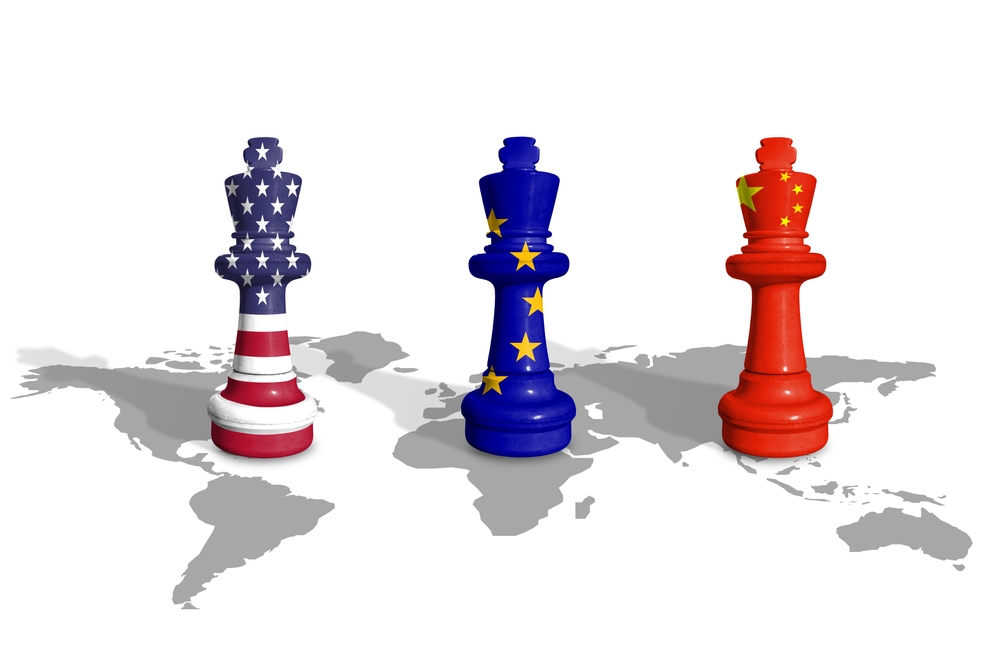For nearly 40 years leaders have known that technology was going to matter, that the Continent was falling behind, and if they didn’t do something Europe would pay a heavy price. Calls for urgent actions, including the 1994 Bangemann report, 2003 Sapir report, and 2024 Draghi report, have been largely ignored.
This week a new alert was raised by three former European prime ministers – the UK’s Tony Blair, Finland’s Sanna Marrin and Italy’s Matteo Renzi – in a report launched on November 17 at a conference in Brussels. They warn that Europe’s place in the world and way of life is at risk. Without a Continent-wide transformation, they say, Europe is likely to be outspent and outperformed in a world increasingly defined by technological leadership.
Will the leaders of today’s do what their predecessors failed to do and initiate necessary bold reforms? It’s a tough ask given that polls show that European voters consistently rank technology, innovation and AI near the bottom when it comes to issues that the EU should prioritize. Voters also oppose the changes needed to improve the innovation ecosystem, such as more flexible labor rules and removing single market barriers.
But the status quo is no longer an option, says the report, which was compiled by the Tony Blair Institute for Global Change. What has changed is not the subject but the world. Today leadership in frontier technologies determines not only economic success but national strength and societal resilience. AI, advanced robotics, clean energy and biotechnology are reshaping every domain, including defense, health, education and manufacturing.
“This is not simply an economic issue it is existential,” say the report. “Technology shapes Europe’s ability to defend its democracies, sustain its welfare systems and project stability in an uncertain world. The war in Ukraine and rising geopolitical competition underscore that digital strength is national strength. What’s more technology is the best bet to achieve government efficiency – a task that will be key to building trust with citizens.”
Recent actions such as Europe’s newly announced Competitiveness Compass, The Apply AI Strategy, the Scaleup Europe Fund and the International Digital Strategy are important steps in the right direction but hide “the serious risks that Europe still faces,” the report says.
The report sets out four decisive steps to strengthen Europe’s position in the AI era:
*Expanding Europe’s global technology influence
*Reforming Europe’s regulations for a strong digital future
*Building Europe’s foundations for the AI era
*Accelerating AI adoption to power Europe’s digital transformation
GovTech Could Be Europe’s Differentiator
All four areas are crucial to prevent Europe from falling irrevocably behind but the one which involves leveraging Europe’s strengths in GovTech to expand its technology footprint could be a path to global leadership in the age of AI.
While Europe will not be able to outcompete the U.S. and China on the development of frontier AI technologies it is in a pole position to develop a full-stack, interoperable, modular and open digital government platform that encompasses digital-identity systems as well as mechanisms for data exchange, service delivery and more, says the report. It recommends that Europe export this distinct model of digital government – “a high-trust, rights preserving and innovation-friendly ‘Agentic State’,” says the report. Doing so could set the global benchmark for how democracies govern in the AI era and expand Europe’s sphere of influence.
“If AI is going to become a core component of everything that governments do it actually matters who gets to build that infrastructure,” Keegan McBride, the report’s lead author, said in an interview with The Innovator. “It is a really important arena for building technological and political influence and it is one of the clearest areas where Europe really does have some pretty strong leverage.”
Europe dominates the United Nation’s digital government rankings, with countries such as Estonia, Denmark, Finland, Sweden and the Netherlands at the frontier, all underpinned by digital identity, interoperable data exchange and secure public-sector Clouds. The X-Road, for example, is a platform used by multiple European countries, which shows how shared components can let services talk to each other securely across public and private sectors. The EU how now locked in the next leap with the European Digital Identity framework and mandated EU Digital Identity Wallets.
Europe already has the basics in place: digital identity, platform interoperability and data security, says the report. It could scale what works: common data standards across ministries; privacy preserving data access for innovation; procurement that rewards software cadence and shared defense grade cloud/compute for critical workloads.
The vision for the next five years is that every resident and business should be equipped with a trusted digital public assistant that orchestrates everything from the opening of a company to organizing care benefits, while every civil servant will work with an AI co-pilot that automates routine tasks, identifies risks and routes complex cases for human judgement.
As AI transforms how states operate, Europe should develop a unified strategy to export its interoperable digital government stack, says the report. This could be done through initiatives such as Global Gateway, an initiative to advance global connectivity in the face of geopolitical and geoeconomic challenges, which could be expanded in scope to include digital public infrastructure and AI-ready government systems. The report also recommends the setting of regional tech hubs across the world, staffed with technologists and diplomats, to promote a European tech stack.
“Countries must know not only that they can choose Europe but that it is the best choice for their technological needs,” says the report. “This will require Europe to build a network of countries aligned with its vision and values, from there it can export its technology stack and make itself attractive to international investors.”
It is estimated that the GovTech market will create almost $10 trillion in public value globally by 2034. Obtaining even a small percentage of this market would lead to “massive financial and geostrategic benefits for Europe,” the report says.
Reform Europe’s Regulations For a Strong Digital Future
Before Europe can expand its influence abroad it needs to put the right building blocks together at home. It has plenty of strengths: Despite lacking its own global technology giants, Europe is home to several world-leading startup ecosystems, supported by a strong culture of research, innovation and entrepreneurship. Six of the world’s ten leading startup ecosystems are in Europe, notes the report. Similarly, seven of the world’s 20 most innovative countries are located in Europe and the Continent is home to top universities and research organizations.
“If Europe were to combine its regulatory strength with advanced technological capabilities and the ambition to expand its influence, the Continent could likely gain significant leverage when it comes to the emerging rules and standards set to define the Al era,” says the report. But building a globally competitive technology ecosystem requires Europe to modernize its digital regulations and address the market fragmentation that makes it harder for European businesses to raise capital, scale and grow. The report recommends accelerating EU-level reforms to create a unified, innovation-friendly digital single market and unlock capital by fast tracking legislation that would hasten the creation of a Continent-wide stock exchange and the adoption of national measures to mobilize pension and sovereign capital, all actions that investors and entrepreneurs have been requesting for more than 20 years.
Build Europe’s Foundations for the AI Era
To be competitive in the AI era Europe needs affordable, sustainable and abundant access to energy and compute. The report recommends Europe:
*Collectively agree to secure at least 10% of global compute capacity, building on existing initiatives such as EU Gigafactories and The European High Performance Computing Joint Undertaking (EuroHPC JU), to create conditions to attract large-scale private investment in AI infrastructure. That’s crucial as Europe is likely to see demand for date center computational power more than triple by 2030, requiring up to $300 billion in new investment. It is currently woefully behind: the U.S. has 17x more compute capacity and the Chinese are building out AI architecture at crucial speed.
* Accelerate completion of the so-called “Energy Union” to lower electricity costs- which are among the highest in the world- and improve resilience. This would help harmonize market rules, modernize grids and accelerate cross-border integration.
*Launch a Continental energy program to coordinate the building of new nuclear power plants and accelerate permissions for renewables, grids and storage. This will be needed as the International Energy Agency projects that demand for electricity from AI and data centers in Europe is set to grow by 70% by 2030.
Accelerate AI Adoption
Europe needs to revamp its education system for the age of AI and reskill workers. In addition, the report recommends:
- Leveraging Europe’s leadership in open data and open-source innovation. Europe’s success in AI will depend on turnings its rich data assets into applications that drive demand. The Data Union Strategy, which aims to boost AI-friendly data use, streamline rules, and expand global data flows, could unlock strategic data assets and, supported by an EU Open Source Trust Fund and an Open Source Maintenance and Resilience Framework, foster an open source ecosystem that lowers barriers to innovation. Public procurement and compute-credit incentives can then create the market pull required to scale adoption across Europe.
- Introducing targeted AI-adoption regulation packages that provide clear rules and harmonized standards and fast track approval paths for sectors such as healthcare, energy, manufacturing and finance.
- Treating AI-driven manufacturing as central to industrial strategy. That means factory networks built from the ground up for flexibility, connectivity and scale; supply chains integrated with real-time data flow; skills aligned with new roles and regulatory frameworks that enable rapid experimentation and transformation.
A Call to Action for Heads of State
The report says success will require three things of leaders:
*A clear, compelling political narrative that connects technology leadership with the issues that citizens care most about. The report notes that in the U.S. AI became politically salient when it was framed as a national security issue; in India digital public infrastructure delivered visible improvements in citizens’ daily lives; and in Ukraine digital-ID app Diia became a symbol of state resilience.
*Strategic Direction. Success will also require sound policy thinking, says the report. Today, European debates too often conflate digital sovereignty with autarky: the belief that Europe must build domestic alternatives for every technology. “This is economically infeasible and strategically confused: true sovereignty is not about ownership, but about leverage and choice,” says the report. “From market size to advanced manufacturing capabilities, European already has a lot of the bargaining chips that can shape global technology ecosystems in its favor,” says the report. Leaders need to ruthlessly prioritize what needs to be done to leverage them.
* Clear political mandates. Technology progress needs to be at the heart of every EU country’s national strategy. “When ministers can block progress on existential priorities it means prime ministers are not doing their jobs,” says the report.
Beyond national borders a coherent and forceful political response will require countries to act as Europe (The EU 27 plus Norway, UK, Switzerland, Ukraine and other countries), when solo action fails to address existential challenges, says the report.
“Without change, Europe’s long-term prosperity and security can’t be guaranteed; at best the outcome would be a managed decline,” says the report.
Rather than be a passive consumer of the emerging tech-enabled geopolitical order that is being shaped, the report says Europe needs to think more like a hegemon, identifying where its strengths lie and using them to actively shape the world in its interests. “If Europe hesitates,” it warns “others will shape the future in its place.
This article is content that would normally only be available to subscribers. Become a subscriber to see what you have been missing






